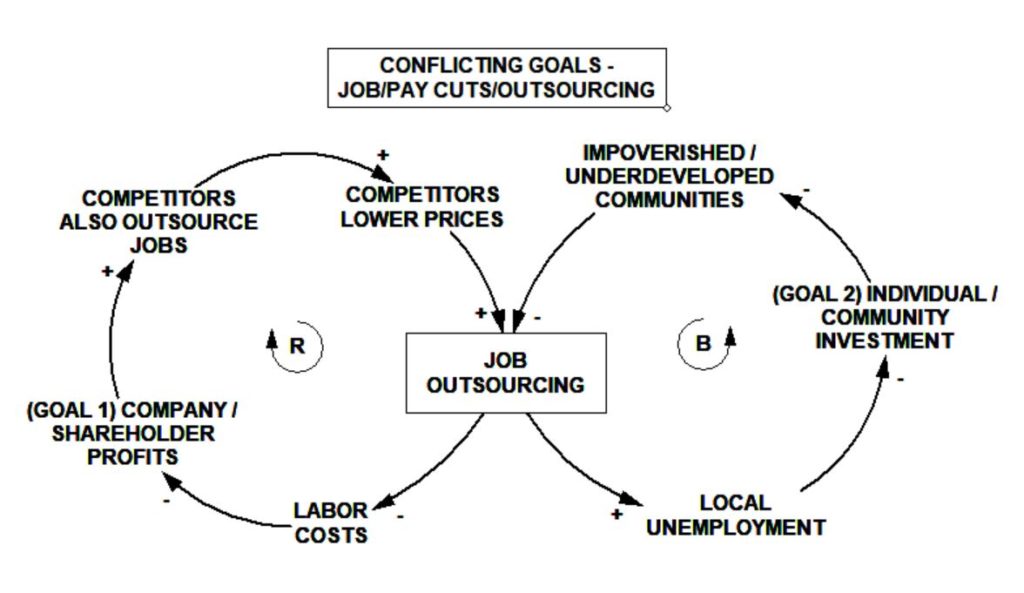No one wants to create poverty. I doubt there is a person in the world that enjoys seeing people suffer in poverty or starve to death. However, our market system inherently generates poverty. Why is this? To understand this dynamic better, we can look at an archetype in systems thinking known as conflicting goals.
It is not the people’s fault — it is the system of wealth distribution that we have created. It is the market economy, the stock market, the monetary system, and all it’s parts. It all creates the incentives and atmosphere conducive to massive wealth on one end of the spectrum and destitute poverty on the other. Because of this, a growing number of people are beginning to understand that Capitalism is not an effective way to meet the needs of neither people or our environment.
Why Does Capitalism Work This Way?
Capitalism works by letting companies grow in order to compete for market share. They generally compete at the expense of each other, the environment, or other people. As they acquire more market share they also become increasingly powerful. Often, this creates a situation where smaller companies are bought out or run into bankruptcy.
On one hand, business owners would like to help people, invest in communities, create jobs, pay people well, and contribute to the wellbeing of people’s lives in their community and workforce.
However, on the other hand, businesses must stay in business if they are to survive, and that often means that they must compete, which often involves lowering wages or outsourcing jobs. Eventually, one of the goals wins out, and action is taken that affects both goals—one positively, and one negatively.
Conflicting Goals Diagram
Lets take a look at the situation through the lens of systems thinking, and examine the feedback loops that are involved. To help visualize how capitalism creates poverty, let us examine the following causal loop diagram. This is an example of the archetype known as conflicting goals.

How Profit Creates Poverty
Let us take a look at the left side of the diagram first. As you can see, in this causal loop diagram, job outsourcing leads to lower labor costs. Labor costs are inversely associated with shareholder profits, so when labor costs decrease, that means shareholder profits increase. However, because of this, other companies eventually outsource their jobs as well, taking advantage of the same mechanism as the first company. Eventually, they lower their prices as well, possibly overtaking market share from the first company. At that point, the first company is in need of ways to additionally lower labor costs in order to stay competitive, and the cycle repeats itself. This creates a positive feedback loop, as indicated by the R with the circular arrow around it. That means that this cycle keeps reinforcing itself until an outside force stops it or intervenes.
On the right hand side of the diagram, we see that job outsourcing leads to local unemployment. Unemployment decreases the amount of individual or community investment in an area. When there is little investment in a community, conditions of poverty generally begin to surface. This creates a balancing feedback loop, which works against the reinforcing feedback loop on the opposite side. This is one of the reasons that in the United States we hear it is important to buy things that are “Made in America.” What is really happening, however, is that this is only happening because capitalism, competition, and the need for lower wages, are all gutting the workforce in favor of profits and automation.
Poverty in the Rust Belt: An Externality of Outsourcing
Because of this, capitalism requires companies to lower their prices in a never-ending battle to gain market share, which results in either outsourcing labor or eliminating it all together (in favor of machines). The effects of this outsourcing and job loss can be commonly seen in areas such as the area of the US known as the “Rust Belt.”
This corridor of towns and cities along the Midwest, stretching into the northeast, was one of the greatest manufacturing regions in the world. However, due to the effects of companies outsourcing jobs overseas for the last several decades, the area is now home to population loss, empty factories, dilapidated infrastructure, and too many impoverished communities to count.
In reality, capitalism can be viewed as a pyramid scheme, where the majority at the bottom work for the benefit of those at top. There, they compete with each other and for lower and lower wages (and thus standards of living) in order increase market share and profits for shareholders.
The System Eventually Collapses
Eventually, people at the top get too greedy, and not enough investment or wealth goes back to the people, or the communities. The lack of care and consideration for the people and/or the planet continues too long. There is insufficient focus on investment in regenerating common resources or environment. At that point there is some sort of revolt, collapse, or both, and forced restructuring of the system. Unfortunately, this seems inevitable at some point within the next few decades.
Capitalism also encourages companies to hoard profits for shareholders. Capitalism, of course, has its supporters—mainly those who are at the top or want to be there someday. What is ironic is that a large percentage of the people who are capitalism’s most fervent supporters are also the ones who stand to lose the most under it. Millions of people are on a shoestring budget, living “paycheck to paycheck,” yet do not realize the instability and disfunction that the capitalist system itself causes.
If you are interested in learning who we are, more about the flaws inherent to our monetary system, and how we could fix these problems, check out the Moneyless Society Podcast, and keep an eye out for my first book — Moneyless Society : The Next Step of Social Evolution — being released May 1st, 2022.


